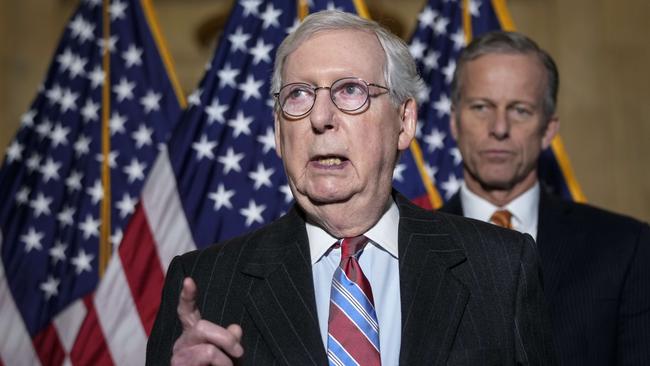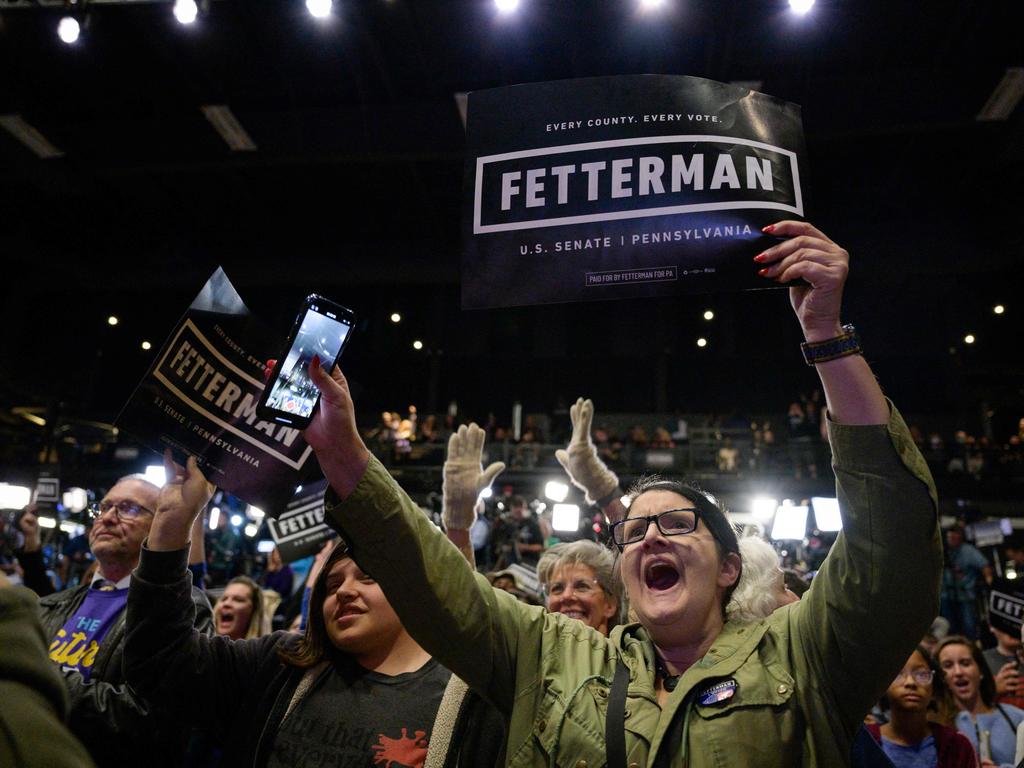Frustrated Republicans try to explain lack of midterm ‘red wave’
Weaker-than-expected results in the midterms for Republicans bring to the surface simmering fears and disagreements over the makeup of the GOP’s lineup.

Weaker-than-expected results in the midterm elections for Republicans set off a wave of second-guessing of the party’s approach in a campaign seen as a prime opportunity to pick off dozens of seats from weakened Democrats.
The GOP still appeared on track to win the majority in the House, though with a much smaller margin than many election analysts and party officials had predicted, amid concerns over inflation and crime under Democratic control of Washington. In the Senate, the margin will likely be tight, and could once again come down to a Georgia runoff as it did in 2020, puncturing party hopes of winning a comfortable majority.
The uncertainty over the result contrasts with the party’s giddy optimism of a possible “red wave” headed into Election Day - and brought to the surface simmering fears and disagreements, particularly over the makeup of the GOP’s lineup.
“As it turns out, candidates and campaigns matter,” said Kevin McLaughlin, an ally of Senate Leader Mitch McConnell (R., Ky.) and a former executive director of the National Republican Senatorial Committee.
Mr. McConnell had aired concerns over some candidates earlier in the cycle, taking public a fight with former President Donald Trump and Sen. Rick Scott (R., Fla.), the head of the Republicans’ Senate campaign arm. He felt their actions to shape the field were advancing Republican candidates who were too extreme or unappealing to win in a general election, potentially costing the party winnable Senate seats. Mr. Scott rejected Mr. McConnell’s comments, and Mr. Trump has called to replace him as party leader.
In a social media message early Wednesday, Mr. Trump called the results “A GREAT EVENING” and said Democrats and media outlets were “doing everything possible to play it down.” Some Republicans said Mr. Trump had undercut the GOP’s chances. “I’m very disappointed,” said Sen. Pat Toomey (R., Pa.), who is retiring after this term. His seat was won by Democrat John Fetterman over Republican Mehmet Oz, whom Mr. Toomey supported.
“I think a huge factor in all of this was the disastrous role of Donald Trump in this whole process,” he said.
Mr. Toomey pointed to the poor showing by Trump-endorsed GOP candidate Doug Mastriano in the Pennsylvania governor race, which he said dragged down the state’s other Republicans including Mr. Oz. “All across the country we see that the hardcore MAGA candidates dramatically underperformed more conventional Republicans, so that’s a big reality that we have to recognize,” he said.
“The party needs to make some decisions on Trump,” said Sarah Chamberlain, head of the Republican Main Street Partnership -- an alliance of GOP lawmakers, some of which represent competitive seats. She said Mr. Trump and the party’s response to abortion had hurt them among independent voters.
In competitive House and Senate races, many candidates that Mr. Trump endorsed were short on political experience and emerged bruised from competitive primaries, potentially hurting their chances. House candidates J.R. Majewski and Madison Gesiotto Gilbert in Ohio and Bo Hines in North Carolina pledged to be standard bearers for the former president, but lacked money and weren’t able to appeal to enough voters needed to win tough seats. They faced a barrage of ads from Democrats painting them as too extreme for independent voters.
“Trump picked sure losers in winnable races,” Gregg Nunziata, a former adviser to Sen. Marco Rubio (R., Fla.), wrote on Twitter. “He picked weak candidates in otherwise slam dunk races requiring the party to spend tons of money we’d rather spend elsewhere,” he wrote.
Some Trump-backed candidates spread conspiracy theories about the 2020 election. Mr. Majewski was at the Stop the Steal rally on Jan. 6. Mr. Hines called for a 10-year moratorium on immigration and said he’d support abortion on a case-by-case basis for government review.
National Republican groups swept in to buy television ads to help them. House Minority Leader Kevin McCarthy (R., Calif.) campaigned and fundraised with them, trying to pull them across the finish line, but all failed to do so.
Mr. McCarthy had confidently predicted last year that Republicans could win dozens of seats, and consistently expanded the target list. In recent days, he was campaigning with Republican Hung Cao, who was running against Rep. Jennifer Wexton, a Democrat, in a challenge both parties thought was a long shot for the GOP. Ms. Wexton won the race in Northern Virginia 53% to 47%.
Abortion also was seen as reining in GOP gains, as defending access to the procedure was a potent motivator for many independents and Democrats, according to polling and members of both parties. During the primaries earlier in the year, many Republican candidates made comments in debates and interviews about limiting or outlawing abortions. Later, after the Supreme Court overturned the right to an abortion, Democrats had ready-made clips for negatives ads.
“Most people thought the economy being not very good, and with the vote being extremely heavy that more Republicans would do well,” said former Republican Sen. Judd Gregg of New Hampshire. People voted on three things, he said: “Trump, abortion, and rejection of Republicans who bought into this cult theory of conspiracy.” One example was in Ohio, where Rep. Steve Chabot (R., Ohio) said that voter concerns over high inflation hadn’t been enough to send him back to Congress. He lost to Democrat Greg Landsman in a district that became unfavorable to Republicans in redistricting.
“We certainly emphasized the economy and inflation, and they were beating me over the head on abortion,” he said. “That’s the thing that beat me,” said Mr. Chabot, an antiabortion candidate who had authored a 2003 law known as the partial-birth abortion ban.
With many races still uncalled and majorities still in reach, some Republicans were wary of explicit finger pointing. But the outcome was likely to hurt Minnesota Rep. Tom Emmer’s bid to ascend to House majority whip, several GOP aides said, as he led the House Republicans’ campaign arm this cycle.
“I don’t know how. We delivered,” Mr. Emmer said when asked if it would complicate his leadership ambitions. He declined to discuss candidate quality or Mr. Trump.
Democrats pushed hard on attacks saying Republicans would limit abortion rights, seeing it as a key way to pull in independent voters. Many were elated when Sen. Lindsey Graham (R., S.C.) introduced a bill limiting abortions after 15 weeks of pregnancy, putting the issue back on the front burner just as many Republicans were seeking to focus on inflation and crime, which they saw as more favorable for attracting swing voters. The bill drew the ire of Mr. McConnell, who said any abortion regulations should be left up to the states.
“I don’t really know how to account for all of this,” Mr. Graham said Wednesday of Republicans’ weaker-than-expected showing. “Pro-life people did well,” he said, pointing to GOP Senate and governor candidates like Ted Budd in North Carolina, Sen. Marco Rubio in Florida and J.D. Vance in Ohio. Still, said Mr. Graham, “I’m sure abortion was an issue in some places.” Marjorie Dannenfelser, president of Susan B. Anthony List, which opposes abortion, said some Republican candidates didn’t have good responses to criticism from Democratic candidates on the issue -- and singled out Mr. Oz in Pennsylvania.
Some candidates “were not prepared and took the ostrich strategy: burying their heads in the sand and running from the issue, allowing their opponents to define them,” she said in a memo sent Wednesday.
Rep. Kevin Brady (R., Texas), the top Republican on the House Ways and Means Committee, said President Biden’s late criticism of Republicans over Social Security and Medicare may have helped Democrats. Some Republicans have called for changes in the programs, such as changing the eligibility age, to extend their long-term solvency.
“Unfortunately, some of that fear mongering works, so that may have had an impact,” said Mr. Brady. “I always worry that it’s awfully easy to scare seniors.”
Richard Rubin contributed to this article.
The Wall Street Journal







To join the conversation, please log in. Don't have an account? Register
Join the conversation, you are commenting as Logout